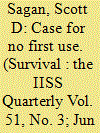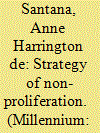| Srl | Item |
| 1 |
ID:
090189


|
|
|
|
|
| Publication |
2009.
|
| Summary/Abstract |
In his 5 April 2009 speech in Prague, US President Barack Obama promised that 'to put an end to Cold War thinking, we will reduce the role of nuclear weapons in our national security strategy and urge others to do the same'. The forthcoming Nuclear Posture Review (NPR), mandated by Congress, provides the administration an opportunity to honour that commitment. To reduce the role of nuclear weapons in national security strategy, however, the next NPR must abandon the long-standing US policy of threatening to use its nuclear weapons first in a variety of military scenarios. This basic step was not taken in the George W. Bush administration's 2001 NPR, despite its claim to institute 'a major change in our approach to the role of nuclear offensive forces in our deterrent strategy' and call to 'both reduce our dependence on nuclear weapons and improve our ability to deter attack in the face of proliferating [weapons of mass destruction (WMD)] capabilities'. Indeed, the 2001 NPR contradicted these stated ambitions by maintaining that nuclear weapons were still necessary to 'provide credible military options to deter a wide range of threats, including WMD and large-scale conventional military force'.
|
|
|
|
|
|
|
|
|
|
|
|
|
|
|
|
| 2 |
ID:
110472


|
|
|
|
|
| Publication |
2011.
|
| Summary/Abstract |
This article criticises the leadership of the new nuclear disarmament movement in the United States for not going far enough. Whether the US administration actually wants to achieve disarmament or not, implementing the current US nuclear policy agenda will not produce a world free of nuclear weapons. Rather, it will reinvigorate an ailing non-proliferation regime by adapting it to confront new nuclear threats. This conclusion is based on a two-part argument. Firstly, nonproliferation is a strategy much like the Cold War-era strategy of extended deterrence. Just as extended deterrence required the US to maintain the credibility of an incredible threat to attack, non-proliferation requires the US to maintain the credibility of an incredible pledge to disarm. Thus, re-establishing disarmament as a credible long-term goal of US nuclear policy will persuade other states in the short term to forgo nuclear weapons and cooperate in restricting access to fissile materials. Secondly, contrary to the common-sense interpretation of the relationship between non-proliferation and disarmament, it does not follow that a robust non-proliferation regime will lead to the elimination of nuclear weapons. In fact, experience suggests just the opposite: Non-proliferation does not lead to disarmament. In conclusion, whatever the Obama administration's aim, the current US nuclear policy will reduce the threat nuclear weapons pose to the US, while obviating the need for the US to disarm itself.
|
|
|
|
|
|
|
|
|
|
|
|
|
|
|
|